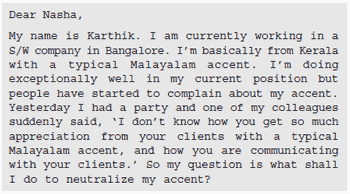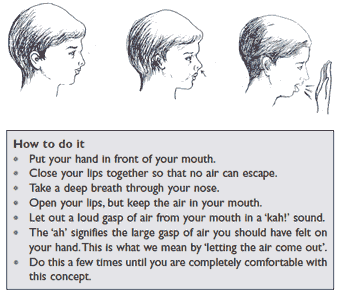
Good communication skills play a huge role in the recruitment process and job applicants who have weak skills are decidedly at a disadvantage. But what exactly are communication skills and how can you perfect yours well enough to get you your dream job?
Nasha Fitter, a teacher, entrepreneur and expert on communications and soft-skilled training, recently launched You're Hired! a book that helps job seekers improve their English communication and job placement skills.
Rediff.com will present a series of excerpts from the book in the coming weeks, and also feature chats with Nasha discussing the topics and intricacies of the job application process.
Here we present the third part of the series, Section II: pronunciation, speech and accent:
Rashmi wants to work in a respected multinational company where she can earn a good salary. She is a smart girl with a degree in commerce, and believes she will be a valuable asset to the organization she works for. Her English is quite good, so she can't understand why she keeps getting rejected. After ten interviews an HR manager finally tells her, 'Rashmi, your accent is too hard to follow. You need to work on neutralizing your accent and improving your pronunciation.' Rashmi feels like crying when she hears this. She has no idea what the HR manager is talking about. No one has ever told her she should 'neutralize her accent' before.
Has this ever happened to you or to someone you know? Did you feel as confused as Rashmi?
Excerpted from
You're Hired! (Rs 199) by Nasha Fitter with the permission of publishers Penguin Books.In this continuing series, we will be featuring excerpts from
You're Hired! covering topics such as pronunciation, speech, accent, email, interpersonal communication and professional etiquette. The author, Nasha Fitter, will also address reader queries every Friday at 12 noon. Get useful interview tips at Nasha's blog: https://nashafitter.rediffiland.com. So if you need help with your job search and career, watch this space!
This is an email I received from a rediff.com reader. It is one that you will perhaps be able to empathize with. Many of us are now being told that we need to 'neutralize' our accents or improve our pronunciation.
This can seem both insulting and annoying at times. Why should anyone have to change his or her accent? Is it really necessary? In this chapter, we will tackle these questions and begin the process of helping you learn how to 'neutralize' your accent.
It is not necessary to put on an accent
Many of you are probably wondering if accent neutralization means 'putting on' a foreign accent. The answer is no. Accent neutralization is about speaking clearly and being understood globally. You should not at any time try to copy a foreign accent, as you will end up sounding funny and unnatural. Instead, this section will teach you to fine-tune and make your own accent clearer and easier to understand.
In this continuing series, we will be featuring excerpts from You're Hired! covering topics such as pronunciation, speech, accent, email, interpersonal communication and professional etiquette. The author, Nasha Fitter, will also address reader queries every Friday at 12 noon. Get useful interview tips at Nasha's blog: https://nashafitter.rediffiland.com. So if you need help with your job search and career, watch this space!

If you speak perfect English but no one can understand you because your voice is muffled or unclear, then what is the point? Now, you may be thinking, 'I was born with my accent and it will always be difficult for people in other countries to understand me. There is nothing wrong with that.'
I disagree. Yes, everyone should keep their unique accent; however, in today's global world, it is crucial to be able to speak to, and be understood by, people in different countries. I also disagree that people in different countries always find it difficult to understand one another.
You might have noticed that English spoken in England sounds different from English spoken in America. Similarly, English as it is spoken in America sounds different from the English spoken in Hong Kong or Singapore or Australia.
But interestingly, for the most part, people from these different countries do not have great difficulty understanding one another. Why is this?
The answer is actually quite simple: people around the world pronounce their consonant sounds in pretty much the same way. That's right -- Australians and Americans pronounce almost all their consonant sounds alike!
Accents in these countries are varied mostly because people pronounce their vowel sounds differently.
! In case you have forgotten -- the vowels are: a, e, i, o, u. The remaining twenty-one letters in the alphabet are called consonants.
In India, many of us actually pronounce our consonant sounds differently from the rest of the world. This makes it difficult for us to be understood at times. Also, this is a major reason why many of us are told that we have 'mother tongue influences' or thick regional accents.
In truth, we are not focusing on our consonant sounds enough. By doing so, anyone can become an effective global communicator. This chapter, as well as the following chapters, will help you improve your consonant sounds.
Before you proceed, take a deep breath. Don't get frustrated if you can't understand a particular sound, or if you find some sounds hard to create. This is normal. To succeed in improving your accent, you have to learn to really listen to yourself. Don't just think about the way you speak; instead, learn to feel the way you speak -- pay attention to how your lungs, mouth, teeth and tongue work together to create different sounds. Let's start the lesson by trying to understand what a sound actually is.
In this continuing series, we will be featuring excerpts from You're Hired! covering topics such as pronunciation, speech, accent, email, interpersonal communication and professional etiquette. The author, Nasha Fitter, will also address reader queries every Friday at 12 noon. Get useful interview tips at Nasha's blog: https://nashafitter.rediffiland.com. So if you need help with your job search and career, watch this space!

Let's start with the ways in which we make different consonant sounds.
Most consonant sounds have one or more of the following three qualities:
1. Strong, aspirated, 'air' sounds, like 'kah!', which is technically called the 'plosive'.
2. Weak, throat sounds like 'ba', which are technically called the 'voiced'.
3. Friction sounds like 'sah'.
Before we get into learning about individual consonant sounds, let's learn what these three qualities mean.
1. Strong, aspirated 'air' sounds like 'kah'
Definition of the sound:
! While practising this sound, place one hand in front of your mouth so you feel the gush of air.
In this continuing series, we will be featuring excerpts from You're Hired! covering topics such as pronunciation, speech, accent, email, interpersonal communication and professional etiquette. The author, Nasha Fitter, will also address reader queries every Friday at 12 noon. Get useful interview tips at Nasha's blog: https://nashafitter.rediffiland.com. So if you need help with your job search and career, watch this space!